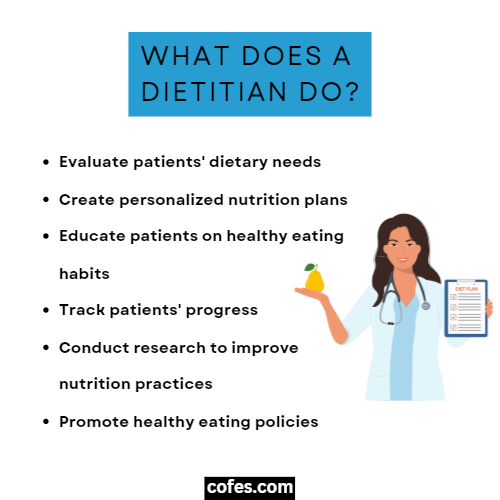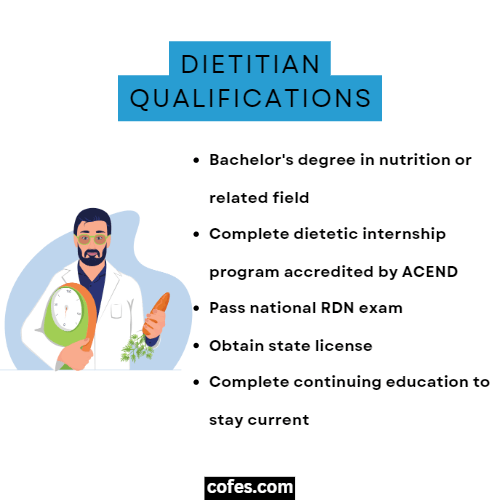Dietitians: The Referees of The Health Industry
Nowadays, everyone is looking for the quick fix or the one superfood that will change their lives forever.
Dietitians deliver wake-up calls to the public about the flaws within the health industry and reveal the facts behind genuinely living a healthy life.
Unlike fitness trainers and coaches, dietitians are responsible for providing a clearer understanding of nutrition.
Dietitians also educate the public on the parts of the health industry the media hides, such as the potential risks of emerging fad diets.
Dietitians empower communities to take steps towards living a healthier lifestyle and enjoying the process.
Dietitian Job Information
| Official Job Title | Dietitian |
| Average Salary | $57,827 |
| Stress Level | Low |
| Work/Life | Average |
| Job Satisfaction | Average |
| Career Advancement | Average |
Dietitian Job Description
What Is a Dietitian?
Dietitians break down complex nutrition concepts and simplify them so others can understand nutrition better.
Dietitians are well-being advocates who empower communities by supporting healthy habits and eating.
Dietitians provide unique insights into nutrition and inform the public about potential risks or emerging fad diets.
Additionally, dietitians work with patients and clients with eating disorders or complex dietary challenges and give them the tools to work through them and come out stronger, healthier, and more educated.

What Does A Dietitian Do On A Daily Basis?
Daily, dietitians are reading up on the latest scientific findings in nutrition.
Afterward, they attend meetings with clients to provide action plans and follow up with support.
They could also be going from one-on-one meetings to group sessions and sometimes larger events such as school assemblies.
Responsibilities, Duties & Roles Of A Dietitian
An overview of the roles and responsibilities of a Dietitian is listed below.
- Stay up to date on the latest scientific research on nutrition
- Educate patients and clients on nutrition.
- Develop meal plans for clients.
- Counsel patients on special diet modifications
- Assessing, protecting, promoting, and enhancing the general public’s health.
- Supervise nutrition and food service programs in hospitals
- Write reports on patient’s progress
- Make compelling presentations that engage audiences
- Provide one-on-one consultations for new patients
- Work with patients to help them achieve their health goals, preferences, and restrictions.
- Conduct several assessments on patients with a complex range of medical conditions.
- Monitor the effects of specific foods and meal plans on specific individuals.
- Facilitate support groups for those struggling with eating disorders
Dietitian Salary
Average Salary
According to Payscale.com, the average salary for a Dietitian in the U.S. is $57,827.
Starting Salary
According to Payscale.com, the starting salary for a Dietitian in the U.S. is $49,869.
Senior Salary
According to Payscale.com, the senior salary for a Dietitian in the U.S. is $70,649.
How To Become A Dietitian
The Entry Level: Certification, Training & Degree
To start your career as a dietitian, you must first earn an undergraduate degree in Science, such as biochemistry, physiology, microbiology, or chemistry.
Dietitians need a strong grasp of the biological makeup of humans and food.
After earning a degree, dietitians must complete a supervised practicum which usually lasts one year.
Then, you must write an exam that ensures safe and ethical practices are followed.

Other Skill Sets, Requirements & Qualifications
- Healthy Lifestyle:
- It is important to practice what you preach.
- Knowledge is only potential power, and dietitians should lead by example.
- Observant:
- Dietitians must be observant of their patients, clients, and other audiences.
- Being able to pick up on social cues and sensitivities is valuable.
- Sometimes, it is not what we say but how we say things that significantly impact others.
- It is essential to take note of that and keep it in mind.
- Flexible:
- Being flexible in your approach to helping clients and patients is an asset.
- Health is not one size fits all.
- What worked for one patient may not work for another.
How Long Does It Take To Become A Dietitian?
Becoming a Dietitian usually takes five years.
First, you must earn an undergraduate degree in science, then complete a one-year supervised practicum.
Finally, passing a licensing exam allows you to work in the state you reside in.
Is It Hard To Become A Dietitian?
Yes.
Becoming a dietitian requires constantly educating yourself on emerging research that could impact your approach to wellness.
You must also stay up to date with the latest fad diets and pop culture trends that can influence your clients and patients.
Dietitian Career Paths
The Dietitian Roadmap
While the Roadmap to becoming a dietitian is straightforward, it is not easy.
Becoming a dietitian requires a lot of preparation and formal training, which can be stressful and sometimes overwhelming.
University is a time in young adults’ lives when physical health can sometimes go on the back burner.
Additionally, with every career comes its unique challenges.
This profession requires aspiring dietitians to be excellent communicators and educators, which can be nerve-wracking for those who feel uncomfortable public speaking.
Projections For Growth In Dietitian Jobs
There has never been a better time to become a dietitian in the U.S.
According to the U.S. Bureau of Labor and Statistics, jobs will grow by 7% through 2031.
With obesity rates at an all-time high, America needs more dietitians.
Summary: Is Being a Dietitian A Good Career?
Being a dietitian can be incredibly rewarding for those looking to significantly impact the communities they serve.
This career path also provides many opportunities to build strong, healthy relationships with clients and patients.
The knowledge you provide can sometimes change the trajectory and outlook of a patient’s entire life, making all the schooling and extensive examinations worth it.
Working Conditions
Can Dietitians Work Remotely From Home?
Absolutely.
Thanks to technology, dietitians can still interact with their clients and support groups and provide insight and advice to emerging struggles.
How Many Hours Does A Dietitians Work?
Dietitians typically work full-time.
Can A Dietitian Work Part-Time?
While working part-time isn’t unheard of, most dietitians work full-time.
What Are The Average Vacation Days Of A Dietitian?
According to Indeed, the average number of vacation days among employees in the US is 11 days.
Several companies reward long-term employees with additional vacation days and flexibility.
Alternative Careers & Similar Jobs to a Dietitian
- Food Scientist
- Nutritionist
- Medical Researcher
- Research Assistant
- Director of Nursing
- School Counselor
- Chemical Dependency Counselor Assistant
- Case Manager
- Physical Therapy Assistant
- Medical And Health Service Manager
- Personal Assistant
Dietitian Resume Tips
If you are applying for a job as a dietitian, it is good to highlight your experience working with those who struggle with mental health issues.
Part of being a dietitian is supporting individuals with eating disorders and distorted views on health and wellbeing.
Your resume should include an executive summary highlighting your best skills, experiences, and qualifications.
To stand out even more, you should include a cover letter.
Surprisingly, this is the first thing hiring managers will look for that most applicants don’t take the time to write.
Dietitian Interview Questions
Q1: What made you decide to become a dietitian?
Why It Works: This is a great opportunity for you to explain what health/well-being means to you and the role it plays in your life.
Q2: What was the most challenging client situation you’ve dealt with?
Why It Works: Hiring managers want to know that you can navigate difficult situations in this field of work.
Q3: What are your values as a dietitian?
Why It Works: This is a chance for you to discuss your approach to nutrition and optimal living.
Jobs Related To a Dietitian
- Wellness Manager
- Medical Scientist
- Public Health Educator
- Dietetic Technician
- Nutritionist
- Public Health Nutritionist
For HR Managers: Tips For Hiring A Dietitian
Key Characteristics To Look For In A Dietitian
- Inviting Demeanor:
- Dietitians work to educate the public about nutrition and healthy living.
- Every person has a different definition of what “healthy” looks like.
- The ability to foster a welcoming and non-judgmental environment for patients and clients is critical to building a relationship with them.
- Empathy:
- Part of being a dietitian includes listening to the struggles that patients and clients face.
- You may not be able to relate entirely to what’s being said, but empathy and validation are crucial.
- Observant:
- Dietitians must be observant of their patients, clients, and other audiences.
- Being able to pick up on social cues and sensitivities is valuable.
- Sometimes, it’s not what we say but how we say things that significantly impact others.
- It is vital to take note of that and keep it in mind.
- Flexible:
- Being flexible in your approach to helping clients and patients is an asset.
- Health is not one size fits all.
- What worked for one patient may not work for another.
Minimum Level of Education & Experience
At the very least, dietitians should have an undergraduate degree in science and be licensed to work in their state.
